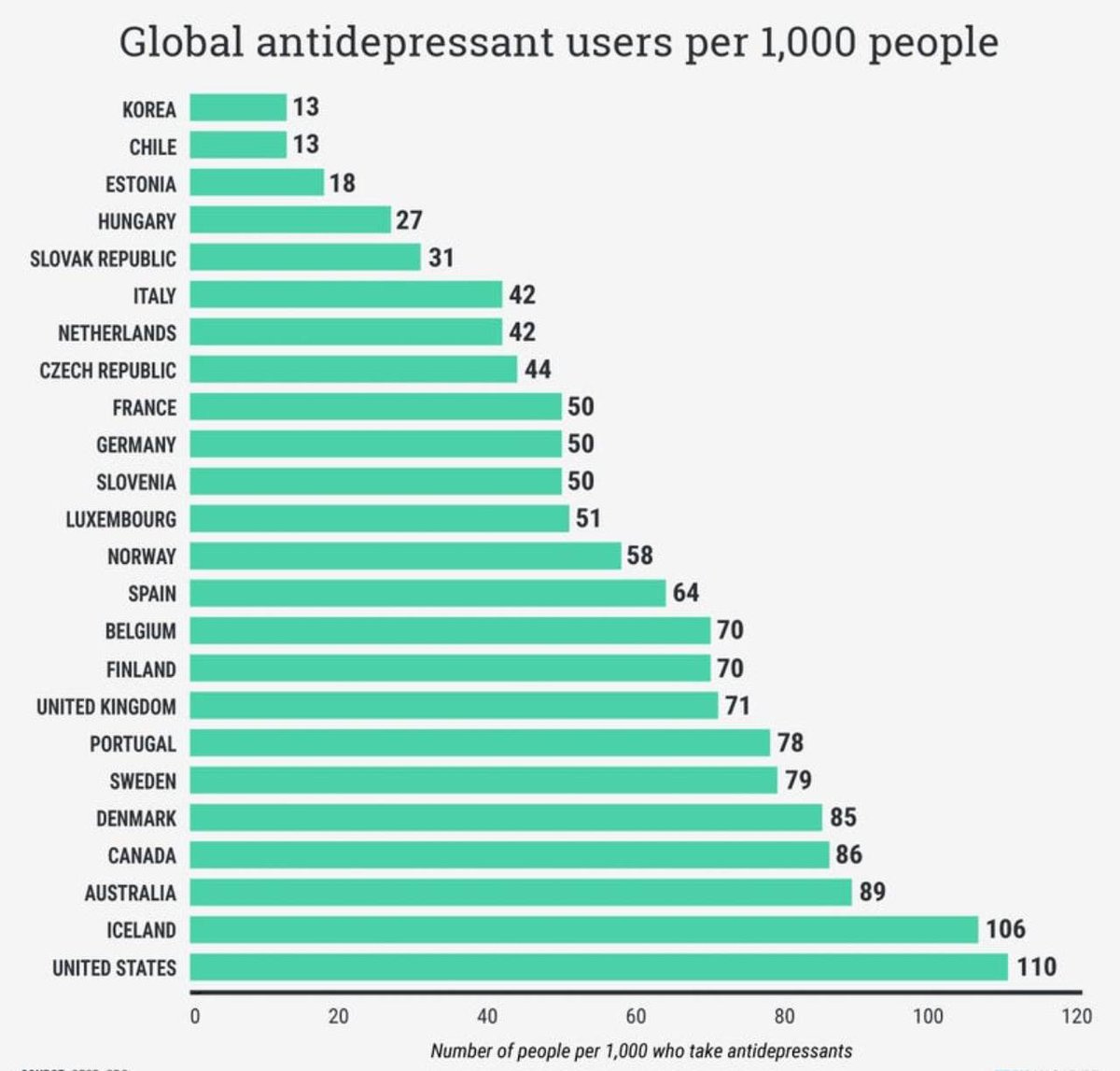After reading Real Anthony Fauci: Bill Gates, Big Pharma, and the Global War on Democracy and Public Health by Robert F. Kennedy Jr. (which I highly recommend), I gained a deeper understanding of the vast and insidious web of medical corruption—spanning Big Pharma, science, so-called researchers, academic journals, politicians, and billionaire narcocapitalists. The extent of this system's reach goes far beyond what I had imagined.
As a health and fitness professional for over 20 years, having lived in multiple countries, I’ve witnessed firsthand how America's decline in health and fitness surpasses that of other developed nations. The question remains: Is there hope for truly Making America Healthy Again?
RFK Jr.’s nomination for Health and Human Services Secretary and his partnership with President Trump to Make America Healthy Again (MAHA) gave millions of Americans hope—a chance for a real voice after years of censorship.
Americans never asked for their food to be filled with dyes and chemicals. That was the work of corporations, cutting costs with cheap sugar substitutes and hyper-palatable additives. They never asked for cancer-causing pesticides to coat their crops or for genetically modified foods to become the norm. They never consented to aluminum, mercury, SV40, embryonic stem cells, and monkey kidney cells being injected into their newborns. Yet, here we are.
It’s 2025, and 73% of military-age adults are unfit for service—not because of war, but because of a toxic system that keeps them sick, overweight, and dependent on Big Pharma’s endless supply of pills for “anxiety” and “depression.” The question is, how much longer can America survive like this?
Some bullet points from RFK Jr’s opening statement at his confirmation hearing yesterday:
Human health & environmental injuries are intertwined. The same chemicals that kill fish, make people sick.
Over 70% of adults and one third of children are overweight or obese
Diabetes is 10x more prevalent that is was during the 1960’s
Cancer among young people is rising by one or two percent a year (not to mention we are seeing the disturbing rise of rapidly developing ‘turbo cancers)
Autoimmune diseases, neurodevelopmental disorders, Alzheimer's, asthma, ADHD, depression, addition, a host of other physical and mental health conditions are all on the rise, some of them exponentially.
The United States has worse health than any other developed nation, yet we spend more on healthcare at least double and in some cases triple as other countries.
Last year we spent $4.8 trillion not counting the indirect cause of missed work. That’s almost a fifth of the GDP. It’s tantamount to a 20% tax on the entire economy.
Other countries have better health outcomes and a healthier workforce.
Today, over half of our country’s men and women are chronically ill.
When health care costs reach 20% there are no good options when it comes to who pays. Shifting the burden between government, corporations, insurers, patients, and families is like rearranging the deck chairs on the Titanic. Ask why are our healthcare costs so high in the first place?: Chronic disease.
CDC states that 90% of health care spending goes toward managing chronic disease
RFK Jr.’s Promise: tax dollars to support healthy foods, scrutinize the chemical additives in food supply, remove financial conflicts of interests from agencies, create an honest, unbiased, gold standard science at HHS accountable to the president, congress, and to the American people. Reverse the chronic disease epidemic and put our nation back on the road to good health.
Click on Picture Above for a Great X Thread Containing Highlights from RFK’s Hearing
Other Facts Presented During Questioning:
“Americans do not like the Affordable Care Act, they would prefer to be on private insurance.” - From numerous X threads regarding the ACA, this is true. Just look at the basic cost for a small family of four making the median household income after taxes which as of 2023, was $69,240.
Who can afford $1,522 per MONTH on an $69,240 combined income? That would be close to 27% of your income up front (you may get some tax credits).
Just search Obamacare Failures on X. There are thousands of personal stories on how Obamacare failed them to include Cadillac plans: “A fatal flaw of Obamacare was forcing a Cadillac health plan on anyone who wanted any insurance. The required 10 essential health benefits crippled its own objectives. And the message to Americans: “You don’t get to choose your insurance or your doctor!” - Dr. Scott Jensen
At the hearing, RFK Jr. stated “We have the highest chronic disease burden of any other country in the world…Americans are the sickest people on earth. The average American that died from COVID had 3.8 chronic diseases.”
The Top 10 Chronic Diseases in the USA:
Here's a list of 10 chronic diseases that are significant in the USA today, considering prevalence, mortality, and impact:
Cardiovascular Disease: This encompasses a range of conditions affecting the heart and blood vessels, including heart disease, stroke, and high blood pressure. It's a leading cause of death and disability in the US.
Cancer: Cancer remains a major health challenge, with various types affecting different parts of the body. It's the second leading cause of death in the US.
Diabetes: This chronic condition affects how the body regulates blood sugar. Type 2 diabetes is the most common form and is often linked to lifestyle factors.
Alzheimer's Disease: This progressive brain disease is the most common cause of dementia, impacting memory, thinking, and behavior.
Chronic Lower Respiratory Diseases: This category includes conditions like chronic obstructive pulmonary disease (COPD), asthma, and emphysema, affecting the lungs and airways.
Arthritis: This involves joint inflammation and pain, with osteoarthritis and rheumatoid arthritis being common types. It can significantly impact mobility and quality of life.
Obesity: This condition is characterized by excessive body fat, increasing the risk of various health problems like heart disease, diabetes, and certain cancers.
Mental Health Conditions: This encompasses a wide range of conditions affecting mood, thinking, and behavior, including depression, anxiety disorders, and bipolar disorder.
Chronic Kidney Disease: This condition involves the gradual loss of kidney function, potentially leading to serious complications.
Oral Health Issues: This includes conditions like tooth decay, gum disease, and oral cancer, which can affect overall health and well-being.
Can Americans Medicate Their way Thin?: Ozempic & GLP-1 Medications are Not a Permanent Solution
In 2024, Americans were bombarded with big pharma advertising the easy weight loss solution: Ozempic & other GLP-1 inhibitors. WebMD reported that more than 1 in 8 Americans have taken Ozempic. In May 2024, a Gallup Poll estimated that 15.5 million Americans, or 6% of the US population reported using injectable weight loss drugs. Without health insurance, Ozempic can cost around $900-$1000 or more for a one-month supply.
What are They?
GLP-1: GLP-1 stands for glucagon-like peptide-1. It's a natural hormone produced in your gut that plays a role in regulating blood sugar and appetite.
GLP-1 inhibitors (or agonists): These medications mimic the action of GLP-1. They work by activating GLP-1 receptors in the body, leading to several beneficial effects.
Examples: Some common GLP-1 inhibitors include:
Semaglutide (brand names: Ozempic, Wegovy, Rybelsus)
Liraglutide (brand names: Victoza, Saxenda)
Dulaglutide (brand name: Trulicity)
Tirzepatide (brand name: Mounjaro, Zepbound)
How do They Work?
GLP-1 inhibitors work through several mechanisms:
Stimulate insulin release: They increase the release of insulin from the pancreas, especially after eating. This helps lower blood sugar levels.
Inhibit glucagon secretion: They reduce the secretion of glucagon, a hormone that raises blood sugar.
Slow gastric emptying: They slow down the movement of food from the stomach to the small intestine, which helps regulate blood sugar and can also reduce appetite.
Increase feelings of fullness: They can increase feelings of satiety, which can lead to reduced food intake and weight loss.
What are they used for?
Type 2 diabetes: GLP-1 inhibitors are primarily used to improve blood sugar control in adults with type 2 diabetes. They can also reduce the risk of major cardiovascular events, such as heart attack and stroke, in people with type 2 diabetes and established cardiovascular disease.
Weight loss: Some GLP-1 inhibitors, like Wegovy and Saxenda, are approved for chronic weight management in adults with obesity or who are overweight with at least one weight-related condition.
Major Side Effects
GLP-1 receptor agonists, like Ozempic, while effective for managing type 2 diabetes and weight loss, can cause a range of side effects.
Common Side Effects:
Gastrointestinal issues: These are the most commonly reported side effects and often lessen over time.
Nausea
Vomiting
Diarrhea
Constipation
Abdominal pain or discomfort
Indigestion/Heartburn
Decreased appetite
Less Common Side Effects:
Fatigue
Headache
Dizziness
Low blood sugar (hypoglycemia): Especially if taken with other diabetes medications like insulin or sulfonylureas. Symptoms can include shakiness, sweating, confusion, and rapid heartbeat.
Injection site reactions: Redness, pain, or swelling at the injection site.
Rare but Serious Side Effects:
Pancreatitis (inflammation of the pancreas): Can cause severe abdominal pain, nausea, vomiting, and fever.
Gallbladder problems: Such as gallstones or cholecystitis (inflammation of the gallbladder).
Kidney problems: Worsening of existing kidney disease or, in rare cases, new-onset kidney problems. Dehydration from severe vomiting or diarrhea can contribute.
Increased heart rate: Some individuals may experience an increase in resting heart rate.
Allergic reactions: Rash, itching, swelling, or difficulty breathing (seek immediate medical attention).
Thyroid C-cell tumors (in animal studies): This risk has not been definitively established in humans, but the medication is generally not recommended for people with a personal or family history of medullary thyroid carcinoma or multiple endocrine neoplasia syndrome type 2.
Gastroparesis: Eli Lilly and Company's Mounjaro is a medication used for glycemic control in Type II diabetics. The tirzepatide drug is one of the most potent GLP-1 RA medications on the market, and its ability to help users achieve considerable weight loss has led some physicians to describe it as the successor of Novo Nordisk's Ozempic (semaglutide). However, despite Mounjaro's efficacy, the medication can cause various undisclosed side effects, such as gastroparesis, also known as stomach paralysis, which has landed uninformed users in hospitals and surgery rooms nationwide.
Gastroparesis, also known as stomach paralysis, is a condition that affects the stomach's ability to empty its contents into the small intestine. Normally, the muscles in your stomach contract to move food through the digestive tract. But with gastroparesis, these contractions are weakened or don't happen at all, causing food to stay in the stomach for too long. Gastroparesis is often a chronic condition, meaning it doesn't have a cure. However, there are treatments available to manage the symptoms and improve quality of life.
Muscle Loss: GLP-1 medications often lead to significant weight loss, and when weight loss is rapid, it can sometimes include muscle mass along with fat. GLP-1 drugs can suppress appetite, leading to reduced food intake. If individuals don't consciously focus on maintaining adequate protein intake while eating less, they may not get enough building blocks for muscle maintenance and growth. The majority of people taking these medications tend to be people who have very poor diets which resulted in them looking for the quick fix to begin with. In addition, Some people may experience fatigue or other side effects from GLP-1 medications, which could lead to decreased physical activity. Less physical activity, especially resistance exercise, can contribute to muscle loss.
Weight Regain is Common: Studies show that many people regain some or all of the weight they lose with GLP-1 inhibitors after stopping the medication. The underlying causes of obesity, including inadequate attention to proper nutrition, mental health issues such as binge eating or other eating disorders, and sedentary lifestyle factors, were not addressed. It became too easy to just ‘not eat’ on the medication.
Ozempic Face
Have you seen people on Ozempic/GLP-1 Inhibitors? Although they are ‘thin’ they look ill with what is called ‘Ozempic Face’ due to the loss of facial fat.
“The loss of facial fat from Ozempic can lead to sagging skin, a hollowed-out appearance, and increased wrinkling that makes people look prematurely aged. Widespread cases of this side effect have been documented as off-label Ozempic use has increased, leaving users to grapple with the unfortunate trade-off of a slimmer body with sagging, aged-looking facial features.” - The Plastic Surgery Center
What can my Fellow Warriors do to Combat Chronic Disease?
5 key things you can do to reduce your risk and improve your overall health:
Maintain a Healthy Diet:
Focus on whole, unprocessed foods: While a diet rich in fruits, vegetables, whole grains, lean proteins, and healthy fats is a good starting point, I highly recommend exploring a macronutrient-based approach to determine the optimal proportions of carbohydrates, protein, and fat for your specific fitness goals.
Limit processed foods, sugary drinks, and unhealthy fats: These can contribute to inflammation and increase your risk of chronic diseases. Adding green tea which is rich in antioxidants, may improve brain function, may boost metabolism & weight loss, may prevent certain types of cancer & so much more would be an added bonus to any diet.
Get Regular Physical Activity:
Aim for at least 150 minutes of moderate-intensity aerobic exercise per week: This could include brisk walking, swimming, or cycling.
Incorporate strength training exercises 2-3 times per week: This helps build muscle mass and improve bone health.
Maintain a Healthy Weight:
Losing even a small amount of weight can have significant health benefits: If you are overweight or obese, losing 5-10% of your body weight (the proper way aka no more than 2 pounds per week after initial water loss) can improve your blood sugar levels, blood pressure, and cholesterol.
Don't Smoke or Vape:
Smoking is a major risk factor for many chronic diseases: Including heart disease, stroke, cancer, and lung disease.
Vaping can cause a variety of lung problems including:
Popcorn lung (bronchiolitis obliterans): Damage to the small airways in the lungs.
EVALI (e-cigarette, or vaping, product use-associated lung injury): A serious lung illness characterized by inflammation and damage.
Increased risk of respiratory infections: Vaping can weaken the immune system in the lungs, making users more susceptible to infections like pneumonia.
Chronic bronchitis: Inflammation of the bronchial tubes.
Exacerbation of asthma: Vaping can trigger asthma attacks in susceptible individuals.
Coughing and wheezing: Persistent coughing and wheezing are common respiratory symptoms associated with vaping.
Shortness of breath: Vaping can make it harder to breathe, especially during physical activity.
Cancer: While more research is needed, some studies suggest that vaping may increase the risk of certain cancers, including lung cancer and bladder cancer.
Quitting smoking is one of the best things you can do for your health: There are many resources available to help you quit.
Get Regular Checkups & Screenings
Early detection is key for many chronic diseases: Talk to your doctor about what screenings are right for you based on your age, sex, and family history.
Regular checkups can help you identify and address potential health problems early on: This can help you prevent chronic diseases or manage them more effectively. I suggest getting bloodwork done every 6 months to include a full hormone panel (thyroid hormones, cortisol, insulin, Vitamin D, estrogen, & testosterone). You don’t need insurance for this. You can use independent lab tests from Ulta Lab Tests or Quest without the need for an initial doctor consultation or referral. You receive the results electronically & then you may choose to either discuss any red flags with your doctor &/or do your own research on how to improve your results.
Additional Tips:
Manage Stress: Chronic stress can contribute to a variety of health problems. Find healthy ways to manage stress, such as working out, yoga, meditation, or spending time in nature.
Get Enough Sleep: Aim for 7-8 hours of sleep each night. You can use a variety of smart watches & rings which monitor your sleep quality to help guide you in filling the gaps.
Limit alcohol consumption: Excessive alcohol intake can increase your risk of several chronic diseases. In addition, it's easy to consume excess calories from alcoholic beverages without thinking, especially wine, which is surprisingly calorie-dense. A typical 5-ounce glass of full-bodied red wine contains 140-165 calories! Pair that with cheese & crackers & one meal can be a full day’s worth of calories.
I truly hope RFK Jr. is confirmed as Secretary of HHS. If he isn’t, it will be yet another undeniable sign of who really controls our politicians—Big Pharma, Big Agriculture, and the billionaire elites profiting from depopulation efforts. Those who vote against his confirmation will reveal exactly who owns them.
This only reinforces the urgency of our fight. As Warriors, we must take a stand and defend our health every single day—because no one else will do it for us.
Until next time my fellow Warriors, stay informed, stay vigilant, Ever Forward!










